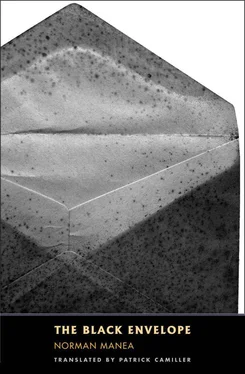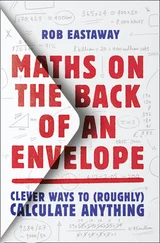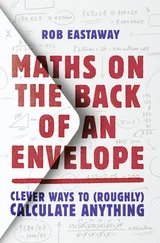IT WAS LATE AFTERNOONwhen Dr. Marga heard about the article in the popular weekly.
The patients had gone out onto the hospital grounds. The doctor was sitting on a bench. He took off his glasses, rubbed his forehead, undid his smock, and tried to relax.
His thin stripe of black beard dripped with perspiration. He wiped it with a handkerchief. He tried to forget his tiredness. He crossed his short arms over a jutting belly and stretched out on his back. His hands were soft, his shoulders, too, but his short legs turned leaden. As he unwound, he gave himself up to a sweet dizziness.
His assistant brought a mug of cold tea and a paper cornet full of tablets. The doctor again passed his palm over his beard and put on his smoky glasses. He swallowed the fistful of tablets and slowly sipped some tea.
“You’re exhausted,” she said. “You’re much too hard on yourself.”
“Too hard — huh! We manage, as they say.”
“You smoke too much. You eat any old how, and you don’t get enough sleep. You must know that the heart. . You have no right. You break all the rules, like a patient who doesn’t have a clue.”
“Ah, but I do know. Suddenly is the best way to go.”
A long silence followed. The wily, hypnotic breeze; a long, invisible peacock’s tail in the pale sky. Yes: the buzzing of mayflies, the insurgent spring with its mad provocations, as if coming from another age, another world.
The assistant was contemplating the sky, not looking at the doctor.
“Let me read you something so you can see how far things can go.”
Her short hands, with fingers laden with rings, took the magazine from under her arm and opened it up. Marga did not seem to be listening. But the woman’s voice became stronger and stronger.
“ ‘Those who tried to do something were abused by the hooligans. The forces of order were alerted. . They arrived on the scene, advised everyone to calm down, and went away.’ Did you hear that, Doctor, they ‘advised.’ As if. .? What more is there to say? Listen to some more: ‘The wrecking of the apartment continued. The militiamen returned, again appealed for calm, and went away.’ Did you hear? They ‘appealed’. . ‘The representatives of order returned a third and last time. The gang left only when they grew bored and tired.’ ”
Marga seemed not to have registered when the voice came to a halt. The woman waited impatiently for some effect. The voice had indeed stopped, but the listener did not react. He seemed to be dozing. No, he wasn’t dozing.
“I think we’ve got a guest,” the doctor was heard to whisper.
Coming up the drive was a petite lady in a brown costume. She had a deliberate way of stamping her feet as she walked. The nurse recognized her at once, of course, but continued to read without paying her any attention. “ ‘Incredible, but that is how things happened. In broad daylight, under the eyes of a whole neighborhood and—’ ”
But the doctor had already stood up. He arranged his glasses on his nose so that the missing eye could not be seen and smiled. The young lady also smiled as they shook hands. The assistant looked up from the page for a moment and went on with a certain irritation.
“ ‘As we write these lines, such-and-such apartment. . in such-and-such street. . looks like after a bombing raid, a fire, or some natural disaster’. .” The plump assistant, Ortansa, turned to the doctor without looking at the visitor. She pursed her thick, heavily painted lips.
“Remember, the victim ran from her home! The newspaper people say she’s sleeping at friends’ and relatives’. The victim is afraid that the attack will be repeated. .” It was not clear whether this information was in the text or was a personal addition.
“So that’s what things have come to! It looks as if we’ll now have the poor woman as a client. It’s the victim who comes to us, not the crazies who wanted to set her on fire. They’ve nothing to worry about, you know. No one locks up the really mad ones, as they should.” By now she was in a fury. She looked at the two nonchalant listeners as if they were implicated in the affair, encompassing them in a more general discontent.
She leaned across the bench and picked up the saucer, teacup, and empty cornet. But then she remained there with them in the lap of her smock. She sat down, spread out, looked at the thin violet clouds, and smiled. Twilight, clouds chasing through the spring sky. But the doctor did not seem to notice, having eyes only for the newcomer. Irina understood, smiled. He took her gently by the shoulders and guided her toward his office.
A long, twisted day, a day that turned her to the point of dizziness. A few times she had felt the need to collect herself in the quiet of a church, but in the end she found herself in Marga’s office. It had still been morning when Irina arrived at the bus stop, under the sway of a refrain whose jarring time induced a kind of idiotic trance. From the point of view of death. . point point point. . point of maximum vision, the perfect clear lucid night, the absent dead, like the living. . the fixed end point, illumination and blindness.
The words returned as a magic spell. A kind of senile impulse, a barely visible point, returning, returning, both extremity and center at the same time. Illumination and blindness, yes, a phosphorescent needle of nothingness, the perfect clear night, the absent dead like the living. Yes, that was it.
Sounds — thick delicate garrulous voices, bubbling. Somewhere, far off, she heard the theater of the world. Trucks, trams, wheels whipping the asphalt with a roar, anarchic voices, a traffic policeman’s whistle, a tin can turning somersaults, an ambulance siren, the muffled hysteria of people lining up for newspapers and potatoes and toilet paper and aspirin.
She opened her eyes: a drowsy convoy of children from a kindergarten was lining up at a crossing near the park.
A daytime creature, that’s what I used to be. Night scared me. A cunning and barbaric swamp. I used to be sunny and earthly, ready to clutch at anything visible, alive. . When oh when did everything change? Now I’m completely given over to the night, my only refuge. The time and geography of night have replaced my days. Now, in the midst of a torrid blindness, it would not even be possible to recognize my face.
The traffic lights had changed from red to green. The children’s column moved off. Little smiles, hands tightly squeezing one another. The stocky woman teacher gave the signal for singing to begin. A long, thin babbling, drip drip, soft, weary, anaesthetized. A sleepy convoy of tottering shadows.
Irina again shut her eyes, violently pressed the lids, reopened them. She crossed the road and walked up the paved slope toward the park. She sat down on the first bench, under a vaulting arch of branches.
She took the newspaper from her pocket and opened it: Via¸ta Noastr  , the national newspaper of the Association. She could not take her eyes from the red-lettered banner that she had known for years, or from the slogan above it: Workers of the world, unite ! It was printed in every paper and magazine in the country, in every office, school, or hospital, seen countless times without ever being seen. This time she read the clarion call, once and once more — as if she were experiencing for the first time its urgent, vigorous meter that demanded a response. What would happen if. .? She woke up, murmuring in amusement. Unity, urgent unity. What if. .?
, the national newspaper of the Association. She could not take her eyes from the red-lettered banner that she had known for years, or from the slogan above it: Workers of the world, unite ! It was printed in every paper and magazine in the country, in every office, school, or hospital, seen countless times without ever being seen. This time she read the clarion call, once and once more — as if she were experiencing for the first time its urgent, vigorous meter that demanded a response. What would happen if. .? She woke up, murmuring in amusement. Unity, urgent unity. What if. .?
“The complex tasks of the Association. Directives and guidelines of the General Secretary concerning the role of the mass organizations and state institutions in implementing the general policy.”
Читать дальше

 , the national newspaper of the Association. She could not take her eyes from the red-lettered banner that she had known for years, or from the slogan above it: Workers of the world, unite ! It was printed in every paper and magazine in the country, in every office, school, or hospital, seen countless times without ever being seen. This time she read the clarion call, once and once more — as if she were experiencing for the first time its urgent, vigorous meter that demanded a response. What would happen if. .? She woke up, murmuring in amusement. Unity, urgent unity. What if. .?
, the national newspaper of the Association. She could not take her eyes from the red-lettered banner that she had known for years, or from the slogan above it: Workers of the world, unite ! It was printed in every paper and magazine in the country, in every office, school, or hospital, seen countless times without ever being seen. This time she read the clarion call, once and once more — as if she were experiencing for the first time its urgent, vigorous meter that demanded a response. What would happen if. .? She woke up, murmuring in amusement. Unity, urgent unity. What if. .?










